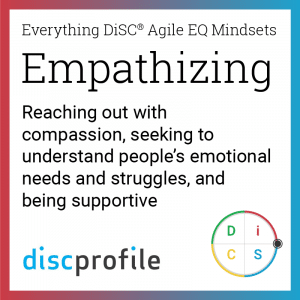Is empathizing one of your natural mindsets in Everything DiSC® Agile EQ™? There are eight Agile EQ mindsets, three of which will be most innate to you. Empathizing tends to align with folks on the iS and Si side of DiSC®. However, it is a frame of mind that is available to everyone to call upon when the situation is right for it.
This article digs into the empathizing mindset: what needs drive it, what its benefits are, and the hazards of over-relying on it.
If empathizing is not one of your intuitive responses and you’d like to develop in that area, see How to be more empathetic.
“I notice how others are feeling.”
People with an empathizing mindset prioritize compassion, caring deeply about the needs and emotions of others. They pay attention to nonverbal cues and notice when someone is upset. They know that everyone is going through something, and direct their energy toward understanding and offering support.
Empathizing people are generally great listeners, not just nodding their heads but really considering what the words mean and reserving judgment. They see the best in people. They draw others out with their warm, accepting demeanor. This contributes to a supportive environment where people aren’t afraid to speak up about their concerns.
Benefits of the empathizing mindset
This mindset brings great value, especially in times when empathy may seem to be in short supply. Being able to see things from another person’s perspective is an important aspect of growing your overall emotional intelligence. The benefits of tapping into the empathizing mindset include:
- relating better to others
- developing stronger relationships
- picking up on verbal and nonverbal cues that something isn’t right
- staying open to the concerns of others
- being respectful of other perspectives
- contributing to a supportive environment that makes people feel safe
- gaining a fuller picture of an issue, leading to better choices and results

Which needs drive the empathizing mindset?
Empathetic people feel fulfilled when their support can make a real difference in someone else’s life. They feel valuable when they make others feel valuable. As is true with all the Agile EQ mindsets, people who are naturally empathizing feel comfortable in that mindset because it allows them to meet the needs most important to them, in this case:
- connection
- acceptance
- strong relationships
- harmony
- a caring, friendly environment
- being helpful
- providing emotional support
Limitations of the empathizing mindset
If you’re a naturally empathizing person, it has probably served you well in many situations. But all mindsets have their limitations and can suffer from overuse. You encounter various situations on any given day, and it’s unlikely that one mindset is the best approach for all of them. If you get stuck in the empathizing mindset, you might:
- minimize your own needs to attend to those of others
- be too lenient, excusing poor behavior or performance
- overextend yourself
- allow your judgment to be compromised
- try to soothe or pacify someone when a different response would be more helpful
- take on someone else’s work if they seem stressed out, which can create unhealthy dynamics and patterns
Growing your emotional agility
Once you understand the mindsets you instinctively reach for, it’s important to gain an understanding of the other Agile EQ mindsets as well. This helps you see the motivations of your coworkers differently, and allows you to stretch into nonintuitive responses, even if they take more energy.
Emotional intelligence is not something mysterious and abstract. Research proves it to be a skill that can be developed with practice. If you’ve committed to growing your EQ, you may want to use Agile EQ to inform your discussions with a leadership coach, mentor, or accountability partner. It can be quite exciting and empowering when you truly start to recognize that there are many options beyond your instinctive ones for any situation you’re in.
See also: How to be more empathetic

